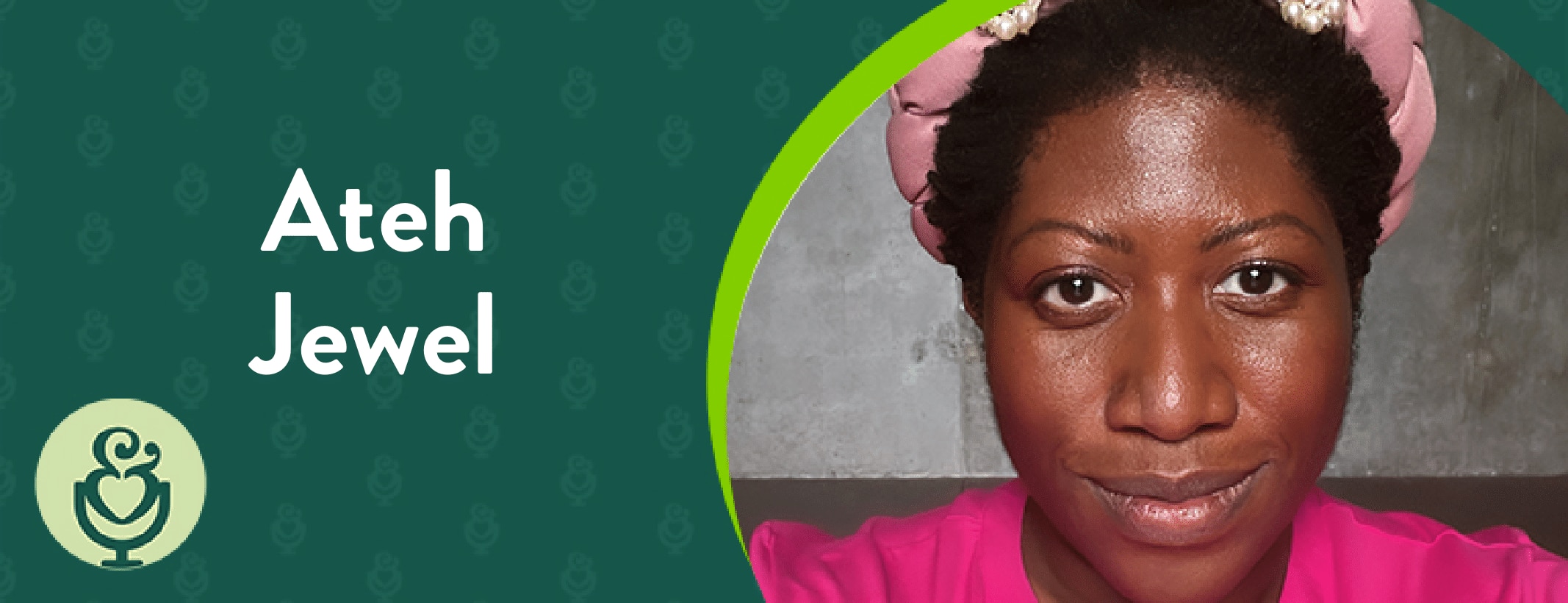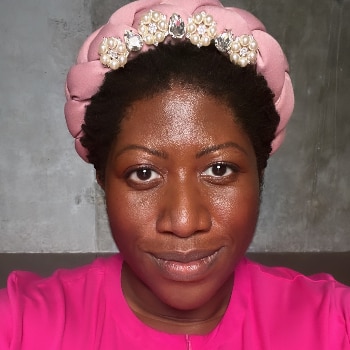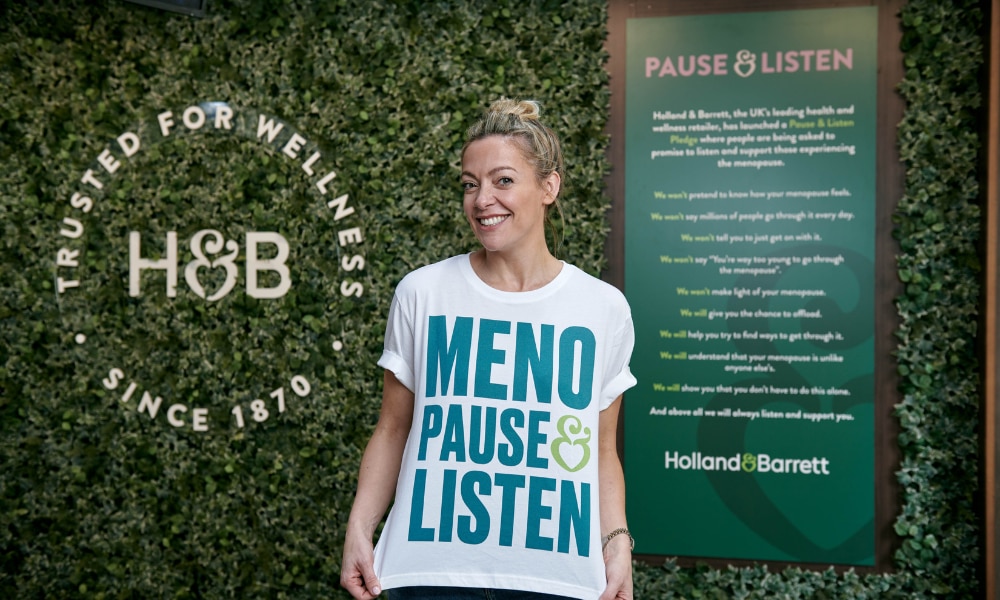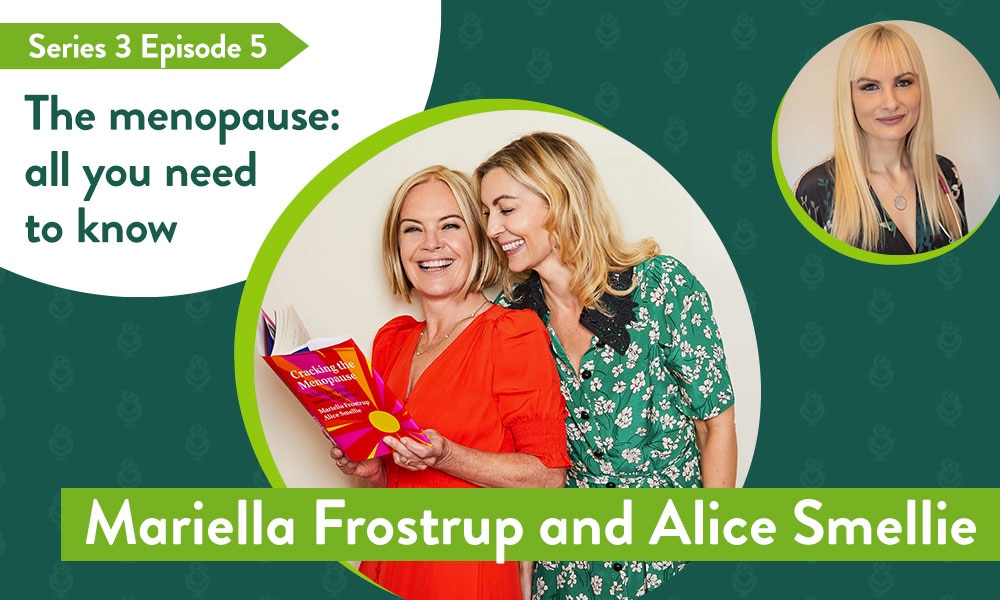S05 E01 | 49m | Menopause, beauty & diversity

Hear Ateh talk about authenticity, make-up as meditation, loving yourself ‘ferociously’ – and why the menopause should be embraced, not feared.
Stream Ateh's episode now...
Listen to Episode 1
“Choice is equality”
Celebrating diverse beauty with Ateh Jewel
Where there’s beauty, there’s Dr Ateh Jewel! She’s spent 20 years showing us that beauty isn’t just one box: it’s woven with culture, history, and power.
We begin our new season joined by Ateh, who today is a journalist, broadcaster, diversity advocate, and creator of the Dr Ateh Jewel Education Foundation.
Having faced discrimination throughout her career, Ateh has worked to “pass the baton” towards a more inclusive generation of beauty.
Along with our host, Dr Gemma Newman, she discusses dressing bright, celebrating age, and asking the uncomfortable questions that make people listen.
What we talk about in the episode...
In 2022, the beauty world has finally woken up to the fact we need make-up that caters for diverse skin tones. But Ateh Jewel has been pushing for more inclusivity in beauty for more than 20 years, writing for everyone from the Guardian to Vogue and Marie Claire along the way.
One of those inspiring people with an infectious enthusiasm for life (she’s currently also campaigning to better support women through menopause), Ateh says: ‘It’s always been about communicating my passion and love for beauty.’
As a former history student, however, she stresses beauty is anything but superficial. ‘Beauty is about politics, culture, values, who we are, what we hold sacred. All those invisible things, which I find fascinating.’
She recounts how, during World War II Churchill had a secret meeting saying they couldn’t ration red lipstick as it would dent morale. ‘I love that. Beauty is about the things that make us happy and give meaning. It’s not just about sexuality or attractiveness.’
On a practical level, beauty can also be mindful. ‘For me, putting on make-up is a form of meditation,’ says Ateh. ‘The routine and ritual of it, the feel everything has an order. These things can be really calming for the nervous system.
‘Beauty can be comforting in a time of chaos and crisis, just to have something that gives you a little bit of joy.’
So how did Ateh end up on this path? After her degree, she felt lost; she tried her hand at advertising, but hated it.
Then her mum said: ‘Make your hobby your job and you’ll never feel like you’re working.’ She thought, I can write and I like beauty, and InStyle magazine had just launched. Ateh says she ‘politely stalked’ herself into a job there, calling the beauty director daily till she had an interview. She came out thinking: ‘I’ve found my people.’
However, as a black woman working in a world dominated by identikit blondes, Ateh was keenly aware of the beauty industry’s lack of diversity. ‘No one looked like me. People would have a foundation launch and think six shades was really diverse. I was always asking uncomfortable questions, and people would tell me things like: there’s not enough room on the shelf, we don’t think there’s a market, people can’t afford this price point. So much racist nonsense.’
The BlackLivesMatter movement was a turning point: she began speaking up for social equality at a higher volume. ‘I’ve been pushing my whole career. But before I’d been politely saying, “excuse me”. After BLM, I thought, we can have this conversation more openly.’ She says more people now understand “choice is equality”.
As the mother of 11-year-old twin girls, she wants to pass the baton on to future generations: ‘Power is about pushing it forward. My mum was part of the civil rights movement in New York. You’re a link in the chain.
‘Diversity is a win-win for society. Finding talent and getting people where they should be is really important for me, and that’s good for everybody.’ It’s something her Dr Ateh Jewel Education Foundation plays a part in, by supporting black and mixed heritage students through university.
Another turning point for Ateh has been changing how she dresses – specifically wearing colour. ‘Before I only wore black, thousand-pound handbags, I chemically straightened my hair. I realise now it was a form of armour I felt I needed.’
She says she was bombarded by daily microaggressions for most of her career. ‘Back-stage at fashion week, working or filing, I’d have: Do you belong here, are you supposed to be here? The message I received was your hair is wrong, your skin is wrong, you’re wrong.’
It was her daughter who challenged the idea her drab dress style was ‘chic and powerful’. Wearing colour has been a revelation. She said: ‘See Mama, you don’t have to hide any more.
‘Who says a grey suit is power? I can wear hot pink and be on CNN. There are all these invisible rules we didn’t sign up for. That’s what racism is, it puts a narrative on people that doesn’t fit. Now I shout being my authentic self is enough.’
As well as being an advocate for greater diversity in beauty, Ateh is working with campaigning group Menopause Mandate to help shift taboos, support women and encourage more open conversations about menopause.
‘The theme running through all the things I’m interested on are power and status,’ says Ateh. ‘I grew up with the menopause being called “the change”. It was this thief that snatched your periods away.’
Instead, we should: ‘Embrace the fact it’s a really transformative time of life. You go into another phase and there is power there. In Chinese medicine they call it the second spring as you have all this energy. By the time you go through menopause you have wisdom and experience. That is to be celebrated. Instead, we’re told: she’s gone loopy, all these horrific misogynist things.’
Education is key. Too often women suffer symptoms without even realising its menopause-related.
‘We all know about night sweats, the poster child of menopause. But there’s joint pain, anxiety, depression. I’ve spoken to people who thought they had dementia because of brain fog. Women leave jobs feeling they aren’t capable. It’s about reaching out for help. Empowering yourself with knowledge, not something to fear.’
So what things make a difference? Positive steps can include: ‘Getting plenty of sleep. Keeping hydrated. Weight training is great for bone density, as you can get brittle bones after menopause. Eat a rainbow diet and reduce your sugar and caffeine.’
And see your GP if you need to: ‘Go armed, go empowered, don’t take no for an answer if you need HRT. Just know you deserve to feel good, and you are worthy,’ says Ateh.
‘But don’t brush it under the carpet. You deserve to feel your most fabulous every day.’
Ateh says: ‘It means taking care of myself as much as I take care of the people I love – and that doesn’t come easy. As mother, you will do anything for your babies to make them comfortable, safe or feel great.
‘For me, wellness is about having that same ferocious love for yourself.’
Listen to this episode now
Ateh’s beauty guide for menopausal skin
Women’s skin changes during menopause. ‘You can get acne like you’re going through your teens again, or maybe you never had it. Your skin can suddenly get dry and sensitive.’
Here’s what to try:
1
Tune in
‘Be intuitive. Many people in their 40s and 50s grew up with the “cleanse tone moisturise” mindset. It’s more listening to: what does my skin need today? It can change week, by week, month by month day by day.’
2
Upgrade your moisturiser
For menopausal skin, she advises a retinol, and the right level moisturiser. ‘What worked 10 years ago might not be great for your skin now: think about using a thicker, heavier moisturiser.’
3
Use serums
‘I would also layer on serums. These are the juice shots of skincare, packed full of ingredients. Look for vitamin C, or hyaluronic acid, which pumps in radiance and moisture.’
4
Lightly exfoliate
This means ‘your skin can receive all these delicious, juicy ingredients.’
Discover more about Ateh and her new beauty range, launching next year, at atehjewelbeauty.com and on Instagram @atehjewel.
She has a chat club every Wednesday and Friday on Instagram Live.









